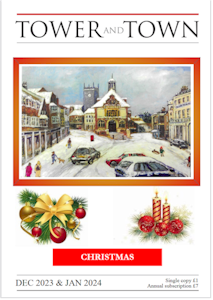

Tower and Town, December 2023 (view the full edition) (view the full edition)Christmas At Marlborough Castle In 1164Marlborough Castle is most famously associated with King John, who granted Marlborough its first charter in 1204. John’s son, King Henry III, brought peace to England in the great hall, where the Statutes of Marlborough were sealed in 1267, ending conflict with the barons. The hall and all of the castle’s buildings are gone, their footprints now in Marlborough College. Only the Mound, once the Castle Motte on which a circular keep once stood, has survived. In the Middle Ages Christmas began shortly before dawn on the 25th December with a dedicated Mass – hence “Christ Mass”. The festival lasted for twelve days and consisted of eating and drinking and making merry. Twelfth Night was the culmination of the festivities. Medieval kings held their courts at Christmas, Easter, and Whitsun – the most important times in the Christian calendar. In 1110 King Henry I spent Christmas at Westminster, Easter at Marlborough, and Whitsun at the New Windsor. Henry’s grandson, King Henry II, spent Christmas at Marlborough Castle in 1164. Writs dispatched in December were sent to the bishops and sheriffs. They were far from merry. To his bishops Henry wrote, “You know with what malice Thomas, Archbishop of Canterbury, has acted towards me and my kingdom, and how basely he has fled. I therefore command you that his clerks, who were with him after his flight, and the other clerks, who have disparaged my honour and the honour of the realm, shall not receive any of the revenues which they have within your bishopric except by my order.” The writ was witnessed by Richard of Luce at Marlborough. Henry ordered his sheriffs to place in custody anyone who had appealed to the court of Rome on Thomas’s behalf.
Six years later, during the Twelve Days of Christmas, Becket, having returned to England, was brutally murdered by four of Henry’s knights in Canterbury Cathedral after Henry famously angrily exclaimed, “Who will rid me of this turbulent priest?” The writs from Marlborough paved the way to Becket’s martyrdom. Nick Baxter |